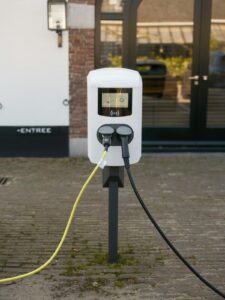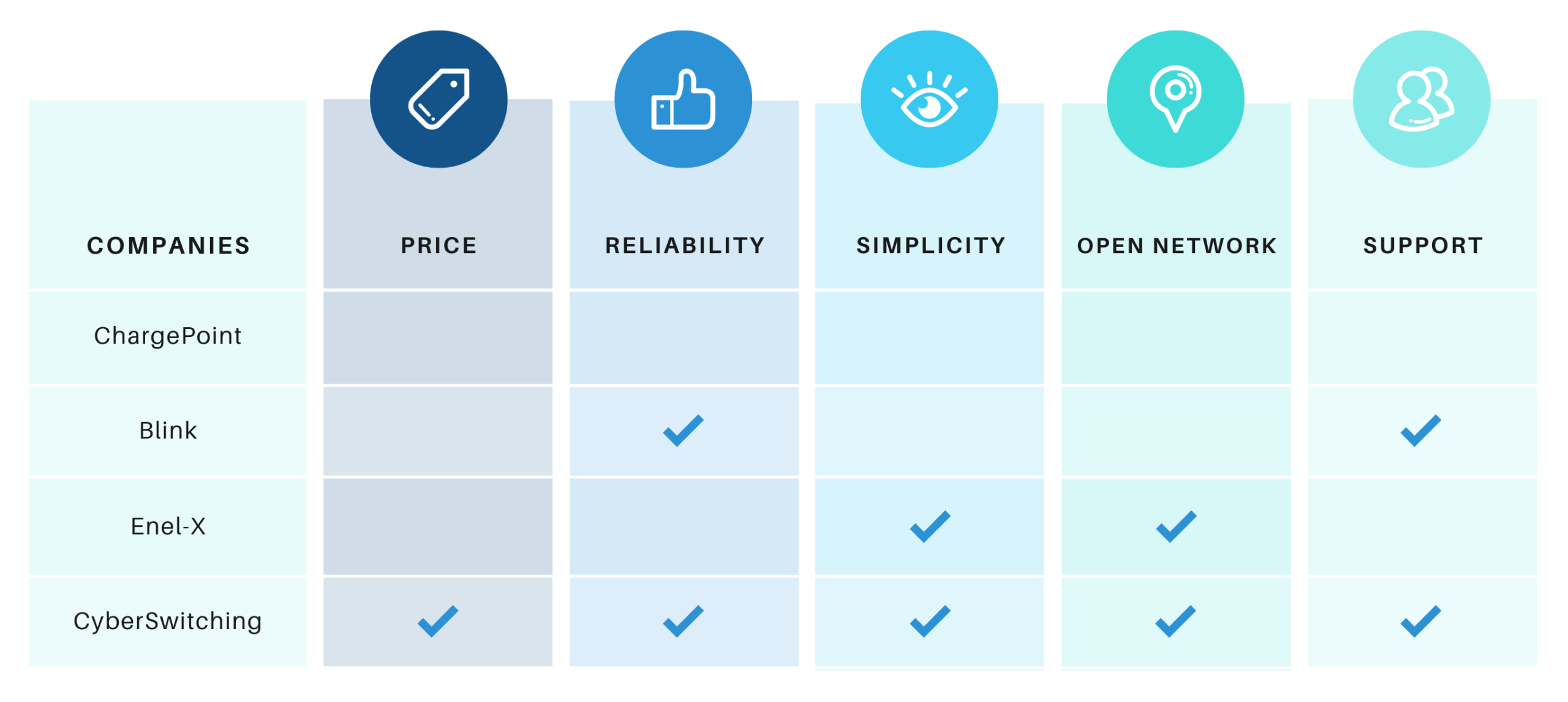
Home / EV Charging News / Commercial EV Charging Station Cost
Commercial Electric Vehicle (EV) charging stations are necessary commodities in areas with great popularity for EVs, also representing interesting investment opportunities. Considering the cost of commercial EV charging stations is a vital part of the planning process to provide EV owners with access to Electric Vehicle Supply Equipment (EVSE).
If you are looking to learn about the commercial EV charging stations cost, this article is for you. Here you will learn about the commercial car charging stations’ costs for hardware, software, and other expenses, which will grant you the ability to make smart and knowledgeable decisions when analyzing budgets for particular EV charging stations.
The commercial charging station cost depends on factors like charger level, power rating, and additional features. This does not include any additional cost to install commercial EV charging stations like the infrastructure, permits, and others.
The equipment cost for EV charging stations can go from $300 to $1,500 for level 1 chargers, $400 to $6,500 for Level 2 chargers, and $10,000 to $40,000 for DC Fast Chargers (DCFCs). The budget will increase further after considering additional required expenses like the following:
These expenses will be explained in detail in the final section of this article.
Commercial EV charging stations can provide EV owners with charging access for their vehicles, which is why the cost to install commercial electric car charging stations should be considered in different key locations. The following is a list of some places that would greatly benefit from installing commercial EV charging stations:
Schools, colleges, universities, hospitals, government offices, and airports, are crowded places regularly visited. Installing commercial EV charging stations in these locations will grant users the ability to charge their vehicles in the location while they do their errands. This increases the comfort for EV owners and makes a profit for the place.
Multi-dwelling units can also enjoy many advantages by installing EV charging stations. They can provide homeowners and visitors with access to powerful EV charging stations, which would make a profit destined for maintenance, operability, and other expenses. Retail businesses can install EV charging services, featuring a more profit-focused mindset for the place.
To properly analyze the commercial electric car charging station installation cost, one of the most important aspects to consider is the level of EV charger installed. In this section, we explain the required voltage, accessibility, and power rating in each case, also considering the cost of the equipment.
Level 1 commercial EV chargers are the most easily accessible options, but they are also the less powerful ones. A level 1 EV charger requires an input voltage of 110 to 120 volts and features a low power rating of 1 kW up to 2 kW, with a cost range going from $300 up to $1,500 before permits and installation.
Level 2 commercial EV chargers are fast and powerful options that tend to require dedicated infrastructure for a voltage input of 208 – 240 volts. The power rate varies from 3kW up to a little more than 20kW, with the cost ranging from $400 up to $6,500, depending on the power rate, manufacturer, and other specifications.
Level 3 commercial EV charging stations, simply known as DC Fast Charging stations, require a dedicated electrical infrastructure to provide from 480V up to 600 volts of input voltage. These types of EV charging stations feature a high power rate going from 25 kW up to 50 kW. The hardware cost for DCFC ranges from $10,000 up to $40,000, before considering electrical infrastructure, permits, soft costs, and others.
To estimate the commercial electric car charger installation cost, you should not only consider the price for the hardware but also additional expenses like the following:
Understanding each of these expenses will help you understand why it is necessary to include them in most or all budgets for EV commercial EV charging stations. You will also learn about the price you might expect to pay for each of these expenses.
Level 3 and some Level 2 commercial EV charging stations require a dedicated infrastructure to provide the right voltage and power to the equipment. These expenses include a feeder and cable pole, a high amp circuit breaker, a power protection system, proper wiring, and labor for the installation. Depending on the requirements, the cost for these expenses can vary from $200 up to $15,000 for Level 1 and Level 2 chargers, or go up to $40,000 for DCFCs, depending on how big of an infrastructure you require.
Soft costs for commercial EV charging stations usually involve the permits, but other expenses required to make the place suitable for a business may also be included. Additional soft costs include charging parking ports, charger logos, signalization, protective bollards for parking ports, and others. In total, soft costs tend to be equivalent to around 5% of the overall budget.
Commercial EV charging stations are required by utilities to install network subscriptions and net metering system software to provide monitoring, protection, and data analysis for the place. Software expenses included in the commercial electric car charging stations cost amount to a little less than $300 annually.
Power management is a series of hardware and software additional features that make commercial EV charging stations “Smart”. An EVSE with a power management system costs around $4,000 to $5,000, which increases the commercial EV charger installation cost, but delivers great features for the EV charging station, reducing power losses, increasing energy usage efficiency, and reducing operation cost.

$2,890.00 Original price was: $2,890.00.$2,790.00Current price is: $2,790.00.
$3,950.00 Original price was: $3,950.00.$3,450.00Current price is: $3,450.00.
$1,650.00 Original price was: $1,650.00.$1,590.00Current price is: $1,590.00.
$2,290.00 Original price was: $2,290.00.$2,150.00Current price is: $2,150.00.
$1,290.00 Original price was: $1,290.00.$799.00Current price is: $799.00.

Your Power Management Partner for Over 25 Years Future Generations Depend on Our Decisions Today ™
2024 © All rights reserved by CyberSwitching